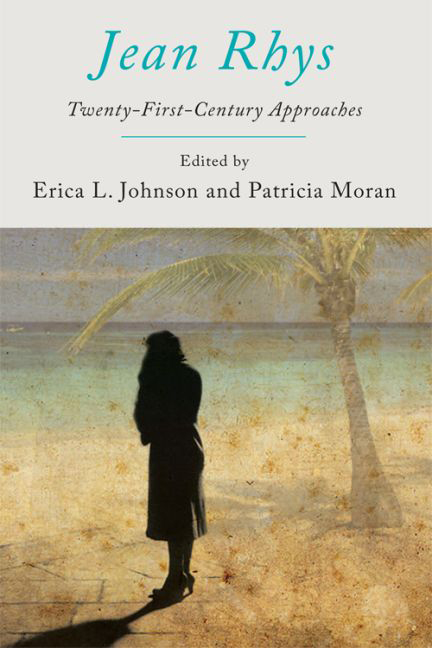Book contents
- Frontmatter
- Contents
- List of Figures
- Acknowledgements
- Notes on Contributors
- Introduction: The Haunting of Jean Rhys
- PART I Rhys and Modernist Aesthetics
- 1 Jean Rhys and Katherine Mansfield Writing the ‘sixth act’
- 2 Making a Scene: Rhys and the Aesthete at Mid-Century
- 3 On the Veranda: Jean Rhys's Material Modernism
- PART II Postcolonial Rhys
- PART III Affective Rhys
- Bibliography
- Index
1 - Jean Rhys and Katherine Mansfield Writing the ‘sixth act’
from PART I - Rhys and Modernist Aesthetics
Published online by Cambridge University Press: 12 September 2017
- Frontmatter
- Contents
- List of Figures
- Acknowledgements
- Notes on Contributors
- Introduction: The Haunting of Jean Rhys
- PART I Rhys and Modernist Aesthetics
- 1 Jean Rhys and Katherine Mansfield Writing the ‘sixth act’
- 2 Making a Scene: Rhys and the Aesthete at Mid-Century
- 3 On the Veranda: Jean Rhys's Material Modernism
- PART II Postcolonial Rhys
- PART III Affective Rhys
- Bibliography
- Index
Summary
Jean Rhys (1890–1979) and Katherine Mansfield (1888–1923) were born within two years of each other in countries that were then British colonies, Dominica and New Zealand respectively. Rhys's relative longevity and the fact that her first publication, the story ‘Vienne’ appeared in 1924, a year after Mansfield's death, have obscured their contemporaneousness. Both Rhys, born Ella Gwendolen Rees Williams, and Mansfield, born Kathleen Beauchamp, finished their formal educations in England and were among those white colonial women excited by ‘new possibilities for physical and social mobility, including new professional and career opportunities’ in England in the first decade of the twentieth century. Their defiance of double standards of sexual respectability would complicate their family and personal relationships. Rhys wrote in exercise books she filled in the 1910s about her relationship with Lancelot Grey Hugh Smith between 1910 and 1912 and its impact on her life. Material in the exercise books would be reworked as ‘Triple Sec’, an unpublished 1924 novel, and later revised as Voyage in the Dark (1934). ‘A Little Episode’, dated as 1909 and published for the first time in The Edinburgh Edition of the Collected Works of Katherine Mansfield (2012), mediates aspects of Mansfield's relationships with Garnet Trowell and George Bowden, to which the discovery of ‘A Little Episode’ has drawn renewed attention. The epigraph to ‘A Little Episode’ is taken from Oscar Wilde's The Picture of Dorian Gray, ‘the so- called “bible” of English decadence’: ‘The one charm of the past is that it is past. But women never know when the curtain has fallen.’ Sir Henry Wotton is instructing Dorian Gray on the propensity of former female lovers ‘to go in at once for reminiscences. That awful memory of woman! […] One should absorb the colour of life, but one should never remember its details. Details are always vulgar’ (131). Dorian reiterates to Basil Hallward the next day, ‘What is past is past’ (138). Rhys, I realised after reading ‘A Little Episode’, alludes to the same passage in The Picture of Dorian Gray in the opening sentence of Voyage in the Dark. ‘It was as if a curtain had fallen, hiding everything I had ever known’ (7), thinks Anna Morgan, the first- person narrator, a Dominican expatriate in England.
- Type
- Chapter
- Information
- Jean RhysTwenty-First-Century Approaches, pp. 21 - 39Publisher: Edinburgh University PressPrint publication year: 2015



